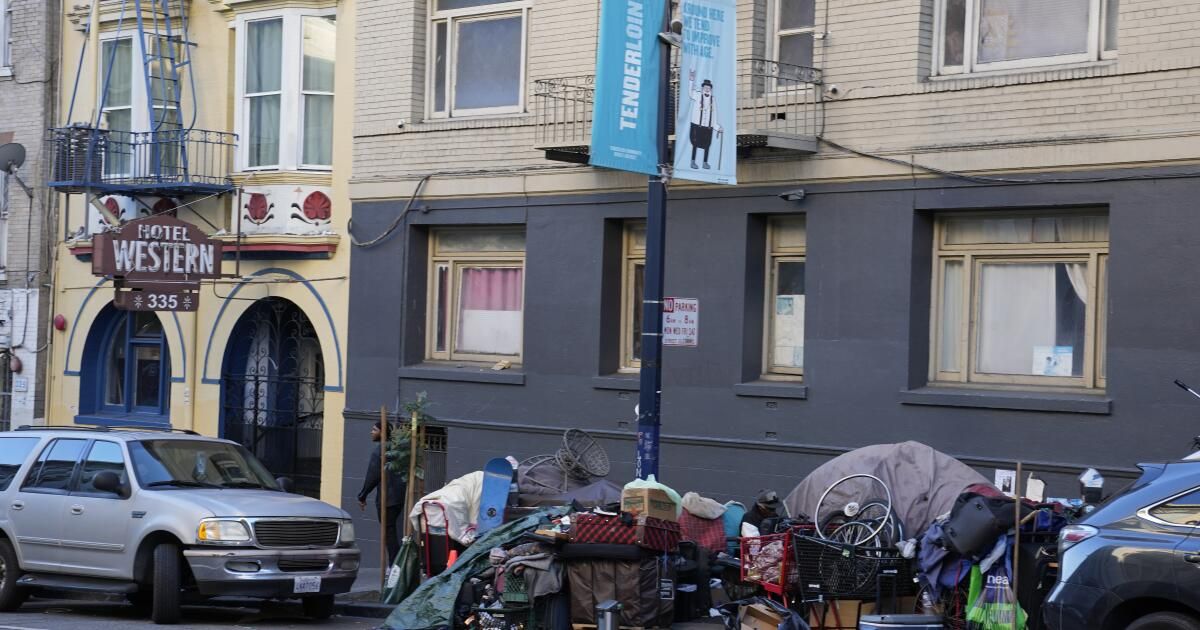San Francisco and Humboldt County officials are trading barbs over Mayor London Breed's plans to more aggressively promote a city program that pays to relocate homeless people to other communities where they have relatives or other ties.
During their meeting Tuesday, Humboldt County supervisors discussed sending a draft letter, addressed to Breed, questioning whether San Francisco was ensuring that the homeless people it is busing actually get housing and jobs.
“We are concerned that providing bus tickets to other jurisdictions without verifying access to housing, family support, or employment will not alleviate homelessness; it simply moves the person to another county,” the letter states.
Supervisors were responding to a recent report by the San Francisco Standard that found Sacramento, Los Angeles and Humboldt counties were the top three destinations for homeless people evacuated by bus from San Francisco beginning in September 2023.
“We don’t have to become a dumping ground,” Humboldt County Supervisor Rex Bohn said at the meeting. “The cost of caring for a homeless person who has nothing here … is expensive.”
Breed's office says the idea that San Francisco is sending its homeless problems north is exaggerated, noting that Humboldt County has also sent people south.
Over the past year, San Francisco has helped five people move to Humboldt County, which in turn has sent four people to the Bay City, according to data from both jurisdictions.
Humboldt County’s concerns center on a San Francisco program called Journey Home that Breed launched in the fall of 2023 to help homeless people return to their home states or move to other California cities where they have family, friends or some history. The city covers the cost of bus, plane or train fare and provides a stipend for meals.
The program is a key component of Breed’s high-profile campaign to more aggressively dismantle the sprawling tent encampments that have proliferated across the city in recent years. The initiative, launched in July, is backed by a landmark U.S. Supreme Court ruling on June 28 that gave local communities greater legal ability to ban homeless people from sleeping in public spaces.
In recent weeks, social workers, backed by law enforcement, have fanned out across the city, ordering people to dismantle their tents, offering them treatment and shelter, and issuing citations if they refuse to accept help.
As part of the initiative, Breed issued an executive directive on Aug. 1 requiring social workers to offer homeless people from outside San Francisco free relocation assistance through Journey Home “prior to providing any other city services, including housing and shelter.”
An estimated 8,300 people are homeless in San Francisco, with about half of them sleeping in parks and on sidewalks in makeshift shelters, according to the city’s Department of Housing and Homeless Assistance. About 40% of people living on the streets said they were not from San Francisco, according to the city’s 2024 homeless survey.
Humboldt County, about 300 miles to the north, has its own problems with homelessness. The numbers are much smaller — about 1,600 people live without permanent housing — but in a rugged rural setting with far fewer resources, local officials are struggling to meet the need.
“It is not that Humboldt has seen an influx of homeless individuals sent to the county from San Francisco,” Christine Messinger, a spokeswoman for the Humboldt County Department of Health and Human Services, wrote in a statement.
“The county and member agencies of the Humboldt Housing and Homelessness Coalition are already seeing our resources stretched to care for the people who live here, and an influx of new people could be detrimental to those efforts.”
As part of its efforts to move people into housing, Humboldt County also operates a relocation assistance program. Over the past year, the county has helped 142 people move to locations around the country, Messinger said, including the four who moved to San Francisco. Nearly 100 more people have been denied assistance.
But supervisors who criticized San Francisco’s approach said Humboldt’s program is far more complex. County workers are supposed to check that participants have family, friends and employment opportunities waiting for them, and keep track of people on the other end of their journeys.
In contrast, Bohn said, San Francisco has not followed up with people who moved to Humboldt County to ensure they have managed to establish themselves and find stable employment and housing.
“All you have to do is say, ‘I want to go here,’ and they give you a bus ticket and you can go. There’s no follow-up or anything else,” Bohn said.
Additionally, he said, San Francisco is essentially giving homeless people the option of leaving the city or taking legal action.
“I don’t want to hurt San Francisco’s feelings,” he said. “But on the other hand, I don’t care.”
Jeff Cretan, a spokesman for Breed, rejected the characterization that San Francisco sends homeless people out of the city without due diligence. He said Journey Home helps “reconnect them with friends, families or communities where they previously lived.” Before busing people to Humboldt, he said, city employees spoke with family members or friends who expressed “loving” them.
And while he acknowledged that Humboldt County is among the most popular destinations for the trip home, he said the numbers are small.
In addition to the five people sent to Humboldt County last year, Cretan said six were sent to Sacramento, five to Los Angeles and 13 to other parts of the state. Seven people were relocated to Nevada and nine to Oregon.
Cretan said he wasn't aware of any requirement for city workers to follow up with Journey Home participants once they relocate, but added, “Sometimes you can't find people either. That's the reality.”
For now, Humboldt leaders have put formalizing the draft letter to Breed on hold. Messinger said county officials will reach out directly to San Francisco employees “to have further conversations before a final decision is made on whether a letter will be sent to the mayor.”












